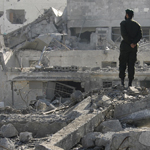Registration
You will receive an email confirming your registration.
IMGXYZ1156IMGZYXArab states are becoming increasingly important players in addressing conflicts in the Middle East. This new engagement has increased in recent years: Saudi Arabia brokered the Mecca Agreement that paved the way to the formation of a unity government between Fatah and Hamas; Qatar took the lead role in settling the Lebanese crisis by creating a government of national unity; and, in the recent Gaza Crisis, the Gulf States played a significant diplomatic role in ending the fighting. It is becoming increasingly clear that real progress in the Middle East is dependent on determined engagement from the Arab states.
Carnegie Europe and the German-Arab Friendship Society (DAFG) held a panel debate on how the Gulf countries can act as catalysts for the Arab Peace Process. Panellists included Marcel Pott, Independent Publicist and Journalist, Marina Ottaway, Director of the Middle East Program at the Carnegie Endowment and Guido Steinberg, Researcher at the German Institute for International and Security Studies (SWP). Sawsan Chebli, Policy Advisor, German Bundestag, Advisory Board DAFG, chaired the debate. Fabrice Pothier, Director of Carnegie Europe, gave the introductory remarks.
Historical Context of the Arab Peace Initiative
Marcel Pott began the discussion by pointing out that approaches to the Arab Peace process have come a long way since the Arab-Israeli Six Day War of 1967. From 1967 until the ‘Fez Plan’ of 1982, Arab states resolutely refused to engage in dialogue with Israel. The Fez Plan envisioned recognition of Israel by the Arab states under certain preconditions. The 2002 Arab League Summit and the subsequent creation of and commitment to the Arab Peace Initiative, a comprehensive plan for normalising Arab-Israeli relations and ending the Israeli-Palestinian conflict, demonstrate a great deal of progress in Arab commitment to peace in the Middle East.
Although the initiative currently remains a viable basis on which a future peace agreement could be built, Pott argued that there is growing Arab frustration over the West’s failure to acknowledge the far-reaching concessions implied in the Arab Peace Initiative. This could ultimately lead to the withdrawal of the proposal and to the subsequent perpetuation of the conflict.
Sharing the Burden
Marina Ottaway argued that Western and Arab states need to share the burden of moving the peace process forward. Despite the Obama administration’s renewal of the U.S. commitment to diplomatic action in the Middle East, its capacity will continue to be limited. Due to traditional ties with Tel Aviv and the influence of the pro-Israel lobby, U.S. politicians will continue to operate within strict constraints when approaching the Israel-Palestine peace process. Arab states will need to take action where the U.S. cannot.
Ottaway emphasized that Arab-U.S. partnership on the Middle East faces crucial challenges. Facing domestic pressures from the pro-Israel lobby, the new U.S. administration is sending mixed signals, leading Arab states to doubt that the United States will live up to its pledge of working towards a fair solution for the Israeli-Palestinian conflict. Arab states can avoid sitting on the sidelines waiting for the United States to put pressure on Israel by transforming the promising Arab Peace Initiative into a workable agreement.
Saudi Arabia as a Key Ally
Guido Steinberg argued that Saudi Arabia’s position in the Middle East is becoming increasingly sensitive, as Iran’s standing in the Middle East increases in proportion to its efforts to be an outspoken challenger of both Israeli and U.S. policy. Saudi Arabia is starting to increase its own diplomatic activities in the Middle East in order to counter Iranian growth and cement its status as a regional power.
Although this increased commitment means that Saudi Arabia will be keen to take action, the West will need to be sensitive to Saudi Arabia’s internal conflict over action on the Israel-Palestine issue. As the key ally of the U.S. in the Middle East, Saudi leaders feel pressure to adopt a neutral stance toward the conflict. The Saudi Arabian population, on the other hand, is pressuring the kingdom to more forcefully address the plight of the Palestinians. Public opinion on the Israel-Palestine issue is so strong that the Palestinian issue has become a rallying call to radicals and terrorists from the whole Muslim world. The kingdom needs to act carefully to ensure that they alienate neither its own population, nor its U.S. ally.
The West will need to take Saudi Arabia’s new commitment to finding a workable solution for the Israeli-Palestinian conflict seriously, if only for the self-serving dimension of dampening the rising anti-American tempers in Saudi-Arabia.
A Need for Careful and Fair Diplomacy
Participants from the floor argued that Western diplomacy vis-à-vis the Palestinian issue is immobile. The justification of Israel’s recent intervention in Gaza, for instance, as an act of self-defense could be seen as an example of an Israeli refusal to compromise, and the West’s inability to act fairly. Marcel Pott called on Americans and Europeans to abnegate what he described as “double standards” towards the conflict. The world needs to work together to address the core problems of the Israeli-Palestinian conflict: Israel’s settlement policy in West Jordan and the unbearable situation in Palestinian refugee camps.
Co-hosted with the German-Arab Friendship Soceity (DAFG).
